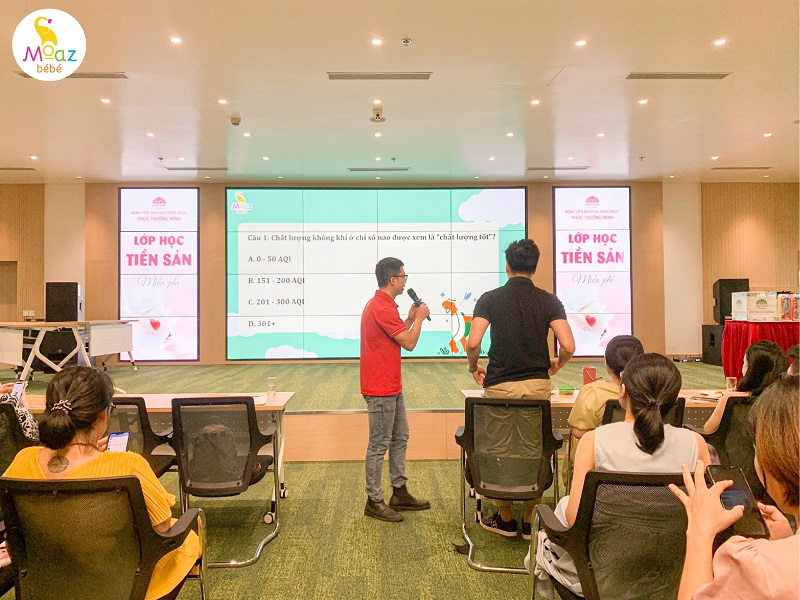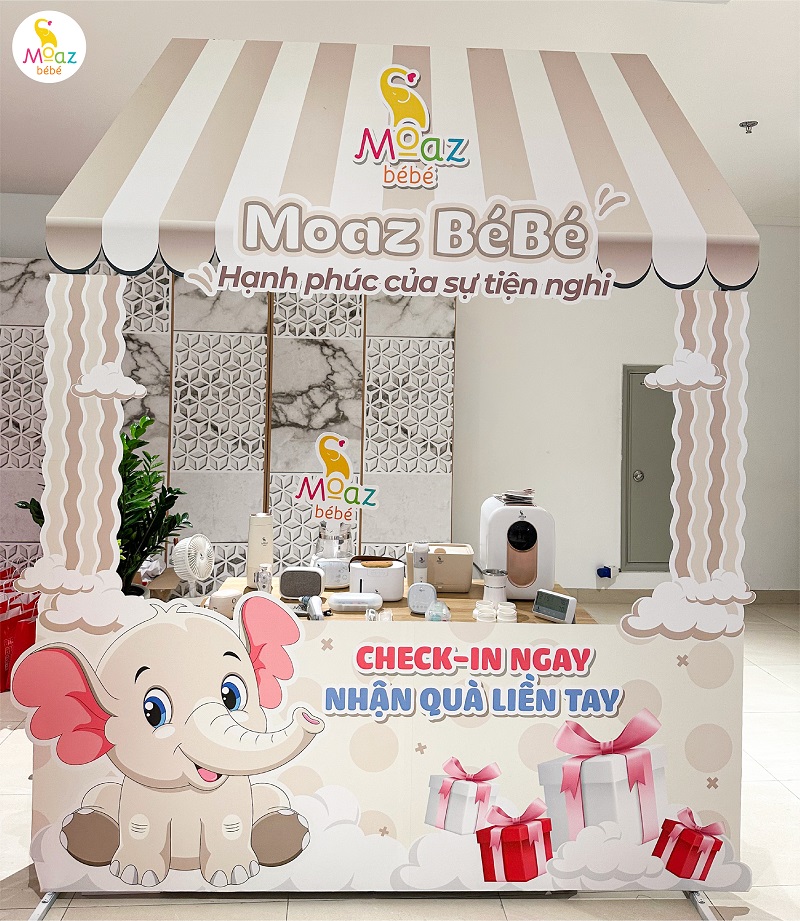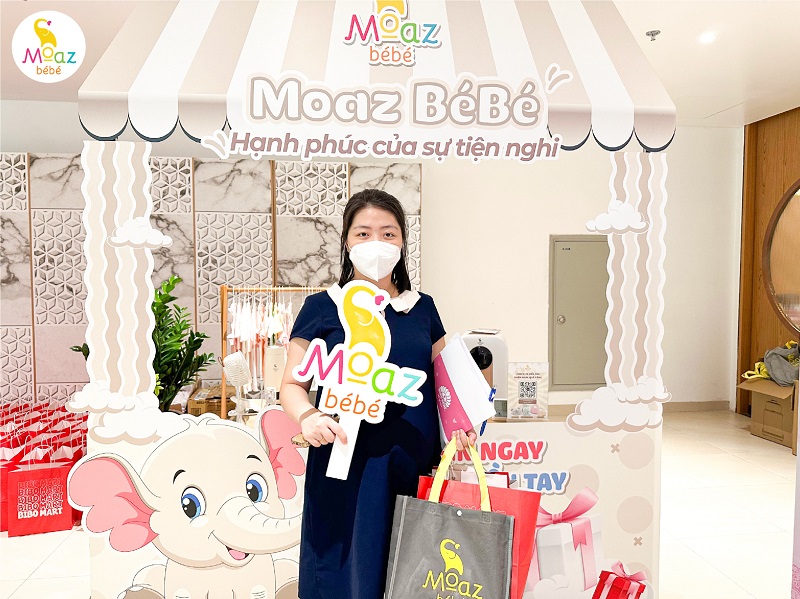On August 5, 2023, Hong Ngoc General Hospital – Phuc Truong Minh in conjunction with Moaz BéBe organized an antenatal class with the theme: “Breast milk is a priceless gift for children”. Realizing the significance of breast milk for the health and development of children, Hong Ngoc hospital experts have shared methods to help mothers have the best milk source for their babies.
Playing an important role in the prenatal class, Doctor Tong Thi Van (Obstetrics Department – Hong Ngoc Hospital) shared useful information and answered questions directly in the class for mothers.
With the topic: “Breast milk is a priceless gift for children” Dr. Tong Thi Van presented main related contents such as:

Prenatal class at Hong Ngoc General Hospital
+ Mechanism of breast milk production and the role of direct breastfeeding
+ Harmful effects of bottle feeding and formula milk
+ How to maintain breast milk supply
Breast milk is the best food for the health and comprehensive development of children
Breastfeeding is a natural way to ensure the child’s development and protect the mother’s health. The World Health Organization (WHO) recommends exclusive breastfeeding for children for the first 6 months of life and should continue for 2 years.
Benefits of breastfeeding
Breast milk is the best food for infants and young children.
Breast milk has many antibodies that help children fight infections such as pneumonia and diarrhea.
Breast milk helps reduce the risk of malnutrition and reduces the risk of obesity in the first years of life.
Breast milk helps develop intelligence more than formula milk.
Breastfeeding limits common allergies caused by breastfeeding (because it is produced from animal milk such as cow’s milk).
Breast milk is readily available, convenient and inexpensive.
Breastfeeding helps increase mother-child affection

Minigame receiving gifts with Moaz BéBé
Mechanism of breast milk production
+ Prolactin reflex: When the baby sucks the breast, it stimulates the secretion of Prolactin. Prolactin causes the breasts to produce milk. Prolactin stays in place for about 30 minutes after a feeding, helping the breast make milk for the next feeding.
+ If the baby breastfeeds more, the mother’s breast will produce more milk
+ Oxytoxin reflex: Oxytocin is a substance that stimulates contractions and milk secretion. During labor, the mother’s brain secretes oxytocin. In addition, when the baby sucks the breast, it stimulates the secretion of oxytoxin. The Oxytoxin reflex is also easily influenced by the mother’s thoughts. When mother has good feelings like closeness. Loving your child will support the Oxytoxin reflex well.
+ Breastfeed as soon as possible.
+ Skin-to-skin contact after birth.
The role of direct breastfeeding
The baby’s tongue massages the mother’s breast to stimulate milk secretion, especially colostrum, preventing the mother from losing milk or having little milk.
Breastfeeding directly will help form a proper latch for the baby right from the start, avoiding the mother having cracked chicken necks or burning pain when breastfeeding.
Babies latch on tightly to the breast to optimize the transfer of milk from mother to baby. Babies normally do not lose energy, so they will gradually abandon the mother’s breast and cause the mother to lose milk
The baby swallows a lot of air due to bottle feeding, leading to bloating and vomiting. Breastfeeding directly from the mother will help the baby enjoy a sterile, temperature-stable milk supply with all the antibodies and nutrients.

Moaz BéBé product consultation display booth
Gian hàng trưng bày tư vấn sản phẩm Moaz BéBé
Harmful effects of bottle feeding and formula milk
Milk allergy is caused by an allergy to proteins in animal milk
Changing the correct latch: the baby sucks and swallows breast milk ineffectively, affecting the rate of milk let-down. When the baby sucks on the nipple, the mother is susceptible to cracked chicken necks and clogged milk ducts.
Letting your baby suck on a bottle or pacifier immediately after birth, alternating between mother and bottle, or practicing bottle feeding in the first 6 weeks will affect the establishment of a “proper latch” when the baby latches on to the mother, reducing effectiveness. and the likelihood of success with exclusive breastfeeding during the first 6 months
Harmful effects of using bottles and pacifiers for children
Babies may refuse to breastfeed because latching on to the breast is different from latching on to a pacifier.
Mothers reduce milk production when they breastfeed their babies less.
Reduced connection between mother and child.
Increased costs of purchasing and cleaning tools.
Increases the risk of children getting infected if tools are not cleaned thoroughly.
In the long term, children are at risk of having misaligned teeth.
Feed your baby breast milk with a cup and spoon if you are temporarily unable to breastfeed directly

All mothers who attend the class receive gifts
Harmful effects of using formula milk
If your baby is not breastfed, he or she is at increased risk of:
+ Otitis media
+ Obesity
+ Diabetes
+ Reduce IQ and intellectual development
+ Acute respiratory infection
+ Diarrhea and digestive disorders
+ Cardiovascular disease
+ Asthma and allergic diseases
+ Childhood cancer
The most correct and effective breastfeeding instructions
Applicable for baby to breastfeed sitting or lying down
Place the baby’s belly close to the mother’s belly
Mother’s arms hug the baby
The baby’s ears, shoulders, and hips are in a straight line
The baby’s face faces the breast
The baby’s nose is opposite the nipple
Some breastfeeding positions
Mother breastfeeds sitting
Mother breastfeeds lying down

Moaz BéBe’s lucky draw gift
When is the baby fed enough? What is an effective breastfeeding session?
Each feeding lasts about 20-30 minutes. When the baby is full, the baby will let go.
After feeding, the baby sleeps deeply for 2-4 hours. When he wakes up, he will be happy, his cheeks will be puffy, and he will not cry.
Mom feels comfortable, her breasts are much lighter and deflated.
Babies’ needs are different, so mothers do not need to worry about breastfeeding volume affecting their psychology and other feedings.
The baby will breastfeed about 12-14 times in the first days, after 1 week there will be 10 feedings/day. The child’s instinct will lead the baby to breastfeed enough and in accordance with the baby’s needs.
The World Health Organization recommends that mothers exclusively breastfeed their babies for the first 6 months without any additional food or water.
The World Health Organization recommends that mothers breastfeed their children for up to 2 years.
The average breastfeeding time per session is 15-20 minutes.
Suck one breast completely and then breastfeed the other breast to ensure the baby gets both foremilk and hindmilk.
Maintain breast milk supply
Breastfeeding properly: Improper breastfeeding leads to reduced effectiveness of breastfeeding, the mother uses extra formula milk for the baby, causing the baby to lose interest in breastfeeding and at the same time the mother loses the reflex to produce and secrete milk. ..
Massage and clean your breasts regularly: before and after breastfeeding, you should clean your breasts with a clean, soft, damp towel. Regularly massaging your breasts helps blood circulation, milk flow… avoids milk engorgement and loss of milk.
Rule “4 more”: eat a lot, supplement enough nutrition, avoid using stimulants. Drinking a lot of water, sleeping a lot causes the brain to secrete prolactin, breastfeeding a lot stimulates the secretion of oxytocin.
In addition, right at the prenatal class, Moaz BéBé organized many gratitude activities for mothers such as: playing mini games, giving gifts, and lucky draws. 100% of participating mothers received gifts from Moaz BéBé. Parents, please follow the next prenatal class schedule on Moaz BéBe’s fanpage to accumulate useful child care knowledge.

